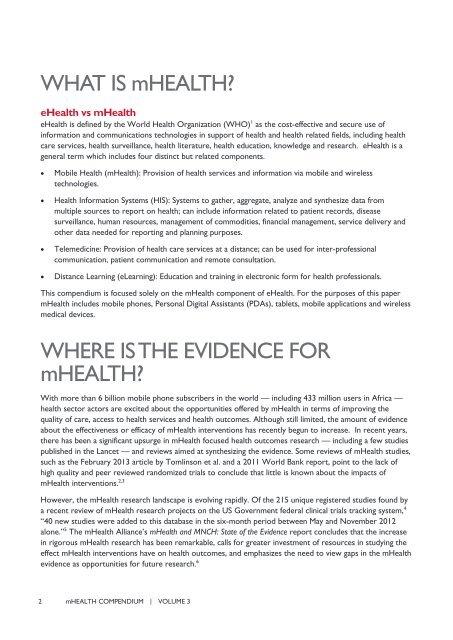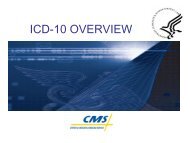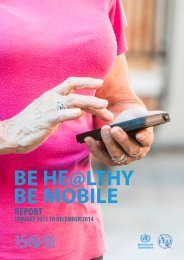mhealth_compendium_volume_3_a4_small
mhealth_compendium_volume_3_a4_small
mhealth_compendium_volume_3_a4_small
Create successful ePaper yourself
Turn your PDF publications into a flip-book with our unique Google optimized e-Paper software.
WHAT IS mHEALTH?eHealth vs mHealtheHealth is defined by the World Health Organization (WHO) 1 as the cost-effective and secure use ofinformation and communications technologies in support of health and health related fields, including healthcare services, health surveillance, health literature, health education, knowledge and research. eHealth is ageneral term which includes four distinct but related components.Mobile Health (mHealth): Provision of health services and information via mobile and wirelesstechnologies.Health Information Systems (HIS): Systems to gather, aggregate, analyze and synthesize data frommultiple sources to report on health; can include information related to patient records, diseasesurveillance, human resources, management of commodities, financial management, service delivery andother data needed for reporting and planning purposes.Telemedicine: Provision of health care services at a distance; can be used for inter-professionalcommunication, patient communication and remote consultation.Distance Learning (eLearning): Education and training in electronic form for health professionals.This <strong>compendium</strong> is focused solely on the mHealth component of eHealth. For the purposes of this papermHealth includes mobile phones, Personal Digital Assistants (PDAs), tablets, mobile applications and wirelessmedical devices.WHERE IS THE EVIDENCE FORmHEALTH?With more than 6 billion mobile phone subscribers in the world — including 433 million users in Africa —health sector actors are excited about the opportunities offered by mHealth in terms of improving thequality of care, access to health services and health outcomes. Although still limited, the amount of evidenceabout the effectiveness or efficacy of mHealth interventions has recently begun to increase. In recent years,there has been a significant upsurge in mHealth focused health outcomes research — including a few studiespublished in the Lancet — and reviews aimed at synthesizing the evidence. Some reviews of mHealth studies,such as the February 2013 article by Tomlinson et al. and a 2011 World Bank report, point to the lack ofhigh quality and peer reviewed randomized trials to conclude that little is known about the impacts ofmHealth interventions. 2,3However, the mHealth research landscape is evolving rapidly. Of the 215 unique registered studies found bya recent review of mHealth research projects on the US Government federal clinical trials tracking system, 4“40 new studies were added to this database in the six-month period between May and November 2012alone.” 5 The mHealth Alliance’s mHealth and MNCH: State of the Evidence report concludes that the increasein rigorous mHealth research has been remarkable, calls for greater investment of resources in studying theeffect mHealth interventions have on health outcomes, and emphasizes the need to view gaps in the mHealthevidence as opportunities for future research. 62 mHEALTH COMPENDIUM | VOLUME 3





